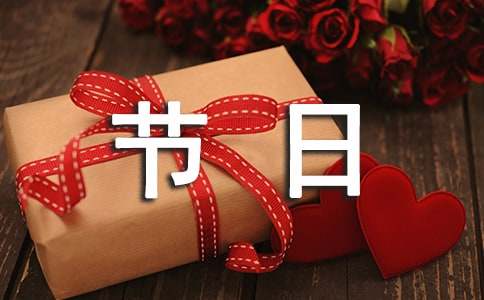- 相關(guān)推薦
傳統(tǒng)節(jié)日的英文單詞怎么寫(xiě)
在我國(guó)有很多傳統(tǒng)節(jié)日,但是很多人都不知道它們的英文單詞具體是怎么寫(xiě)的。下文是百分網(wǎng)小編為大家準(zhǔn)備了中國(guó)傳統(tǒng)節(jié)日的一些英文單詞相關(guān)內(nèi)容,希望能對(duì)大家有所幫助!

傳統(tǒng)節(jié)日的英文單詞怎么寫(xiě) 1
中秋節(jié)的英文單詞:Mid-autumn Festival
1. August 15th annual Lunar New Year, is the traditional Mid-autumn festival.
每年農(nóng)歷八月十五日,是傳統(tǒng)的中秋佳節(jié)。
2. Nowadays, there are hundreds varieties of moon cakes on sale a month before the arrival of Mid-autumn Festival.
在中秋佳節(jié)到來(lái)之前的一個(gè)月,市場(chǎng)上就有成千上萬(wàn)的各種各樣的月餅出售。
3. I will tell you the phone numbers of a stranger, he is joking that he would help to the Mid-Autumn full moon night, I tell you; Imissed you, I am your mind, heart, I wish you a happy Mid-Autumn Festival!
我將你的手機(jī)號(hào)碼告訴了一個(gè)陌生人,他叫月老,他會(huì)在中秋月圓夜要幫我告訴你;我心思你,我心念你,我心祝你中秋快樂(lè)!
4. In fact, I particularly like the joyful atmosphere of the Mid-Autumn Festival.
其實(shí),我特別喜歡中秋節(jié)這種很溫馨的氣氛。
5. Of the Mid-Autumn Festival, the moon is as bright as silver.
農(nóng)歷中秋夜,月亮象銀子一樣亮。
6. The son grew up and cried for his mother, so Wu Gang had to disguise himself as a farmer and gave his son a pair of shoes which could take him to see his mother in the Palace on the Mid-Autumn Festival.
兒子長(zhǎng)大了,哭著找娘。吳剛聽(tīng)見(jiàn)了,不忍心,扮成村夫模樣來(lái)見(jiàn)這個(gè)孩子,送給他一雙登云鞋,讓他中秋節(jié)穿了去見(jiàn)娘。
春節(jié)的英文單詞:the Spring Festival
1. During Spring Festival time, you can see kinds of decorations. you can go to temple fairs and enjoy superb performances of the dances, stilt-walking and amazing acrobatic shows.
春節(jié)期間,最重要的日子是除夕和前三天。春節(jié)有許多的傳統(tǒng)習(xí)俗。在春節(jié)的時(shí)候,你可以看到各種各樣的節(jié)日裝飾。你可以去廟會(huì),享受華麗的舞蹈表演,踩高蹺和驚人的雜技表演。
2. Learn a dargon dance get ready for Spring Festival make lanterns sweep the floor cook meals ba at work sweep away bad luck help sb.
學(xué)習(xí) dargon 跳舞為春天做好準(zhǔn)備節(jié)日的使燈籠掃除成為地板廚師一餐 ba 在工作中離開(kāi)的掃除不幸?guī)兔?sb。
3. It`s the busiest season in China because of Spring Festival.
因?yàn)榇汗?jié),這是中國(guó)最繁忙的季節(jié)。
4. Each family would light firecrackers and paste up Spring Festival couplets, and the relatives and friends would send New Years greetings to each other to wish everything smooth in the new year.
過(guò)年的時(shí)候,每家都放鞭炮,貼春聯(lián)。親戚朋友之間要相互拜年,預(yù)祝在新的一年里事事順利。
5. The children are very happy because the Spring Festival is coming.
因?yàn)榇汗?jié)要到了,所以孩子們都十分的高興。
清明節(jié)的英文單詞:Tomb-sweeping Day
1. Today is Tomb-sweeping Day, this feeling is much stronger than before.
今天是清明節(jié),我的這種感覺(jué)比以往更強(qiáng)烈。
2. To beg its fresh and tender, a few tea grower begin to collect tea before tomb-sweeping day, such tea is called tea of a kind of green tea picked before Pure Brightness, the tea that rainwater collects before this solar term, tea of a kind of green tea that be called.
為求其鮮嫩,一些茶農(nóng)在清明節(jié)前就開(kāi)始采茶,這樣的茶被稱(chēng)為明前茶,雨水這個(gè)節(jié)氣前采的茶,被稱(chēng)為雨前茶。
3. Jinjunmei is made of tea bud tips which are picked before Tomb-sweeping Day from a rare and primitive specie of wild tea which grow on mountains, in the National Natural Conservation Area of Wuyi Mountain, with an attitude of 1500 to 1800 meters.
金駿眉是于清明前采摘于武夷山國(guó)家級(jí)自然保護(hù)區(qū)內(nèi)海拔1500-1800米高山的原生態(tài)小種野茶的茶芽芽尖部分制作而成。
4. Over time, Hanshi Day was replaced with tomb-sweeping day.
隨著時(shí)間的推移,寒食也為清明節(jié)所替代。
5. Tomb-sweeping day is a holiday, the ancestor worship is mainly grave, grave is ShenZhongZhuiYuan, happily, close to shew piety and specific performance.
清明節(jié)是一個(gè)祭祀祖先的節(jié)日,主要是掃墓,掃墓是慎終追遠(yuǎn)、敦親睦族及行孝的具體表現(xiàn)。
6. You know it was Tomb-sweeping Day in China, so I decided to go to the cemetery there on purpose.
嗯,你知道在中國(guó)那天是清明節(jié),所以我特意去了那兒的墓地。
7. It happens to be Tomb-Sweeping Day these days, so I yearn for my past ten years deeply.
這幾天正好是清明節(jié),所以我對(duì)自己已經(jīng)逝去的十年特別的懷念。
8. Every Tomb-sweeping Day I go there, I feel cold and a strange sense.
每到清明節(jié)去墓地,我都會(huì)覺(jué)得寒冷和一種怪怪的感覺(jué)。
傳統(tǒng)節(jié)日的英文單詞怎么寫(xiě) 2
New Years Day 元旦(1月1日)
The Spring Festival 春節(jié)(農(nóng)歷1月1日)
The Lantern Festival 元宵節(jié)(農(nóng)歷1月15日)
The Dragon Boat Festival 端午節(jié)(農(nóng)歷5月5日)
Mid-autumn(Moon) Festival 中秋節(jié)(農(nóng)歷8月15日)
Double-ninth festival 重陽(yáng)節(jié)(農(nóng)歷9月9日)
National Day 國(guó)慶節(jié)(10月1日)
Winter Solstice Festival 冬至節(jié)(12月23日)
New Years Eve 除夕(農(nóng)歷12月30日)
ChingMing Festival; Tomb-sweeping Festival 清明節(jié)(4月5日)
International Labour Day 國(guó)際勞動(dòng)節(jié)(5月1日)
【傳統(tǒng)節(jié)日的英文單詞怎么寫(xiě)】相關(guān)文章:
幸福英文單詞怎么寫(xiě)07-07
幸福的英文單詞怎么寫(xiě)07-07
女士英文單詞怎么寫(xiě)01-27
狗狗的英文單詞是怎么寫(xiě)的01-27
漢字幸福的英文單詞怎么寫(xiě)01-27
表示猴子的英文單詞怎么寫(xiě)01-27